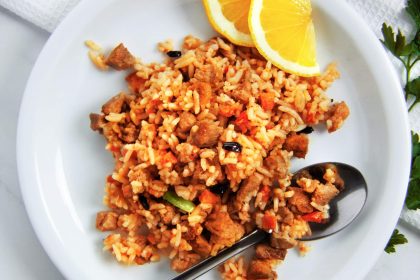Rice vinegar is a popular ingredient in many Asian cuisines, widely used for everything from sushi rice to salad dressings. Brown rice vinegar, on the other hand, is a newer addition to the culinary world, and has gained popularity in recent years due to its purported health benefits.
- Rice Vinegar – What is it?
- Brown Rice Vinegar – What Makes it Different?
- Nutritional Comparison: Rice Vinegar Vs. Brown Rice Vinegar
- Which Has the Better Flavor: Rice Vinegar or Brown Rice Vinegar?
- Flavor
- Color
- Nutritional Value
- Cooking Methods
- Potential Health Benefits of Rice Vinegar and Brown Rice Vinegar
- Side Effects of Using Rice Vinegar Vs. Brown Rice Vinegar
- Where to Find Rice Vinegar and Brown Rice Vinegar
While both vinegar types are made from rice, there are some key differences between them that affect their use in cooking.
The main difference between rice vinegar and brown rice vinegar is the way they are made. Rice vinegar is made by fermenting rice with water and a strain of bacteria known as Acetobacter.
Brown rice vinegar, on the other hand, is made by fermenting brown rice with vinegar culture (a mix of vinegar and yeast). This process gives it a more complex flavor profile than rice vinegar, with a slightly sweet, nutty taste.
When it comes to cooking, both rice vinegar and brown rice vinegar can be used in a variety of dishes. Rice vinegar is often used in Asian cuisine as a condiment for sushi, as well as a base for salad dressings and marinades. Brown rice vinegar, on the other hand, is a popular ingredient in health-conscious cuisine, as its complex flavor pairs well with vegetables and plant-based proteins.
Additionally, some people believe that brown rice vinegar may have more health benefits than rice vinegar due to its higher concentration of amino acids and antioxidants.
Rice Vinegar – What is it?
Rice vinegar is a type of vinegar made from fermented rice. It’s a staple ingredient in many Asian cuisines, particularly Japanese, Chinese and Korean. Rice vinegar is often used in marinades, salad dressings, dipping sauces, and sushi rice.
There are different types of rice vinegar, but the most common ones are white rice vinegar and brown rice vinegar. White rice vinegar is made from white rice and has a mild, slightly sweet flavor, while brown rice vinegar is made from brown rice and has a stronger flavor and darker color.
Rice vinegar has many uses in cooking, not just as a salad dressing or marinade. It can be used as a substitute for other types of vinegar in many recipes. Because it has a mild flavor, it’s great for balancing out the sweetness in dishes, such as stir-fries and sauces.
One of the advantages of using rice vinegar is that it’s low in calories and fat. It’s also gluten-free and vegan-friendly, making it a great choice for those with dietary restrictions.

In addition to its culinary uses, rice vinegar has been used in traditional medicine for centuries. It’s believed to have antibacterial and antiviral properties, and is often used to treat infections and digestive problems.
Rice vinegar is a versatile ingredient with a range of culinary and medicinal uses. Whether you’re looking to add a tangy flavor to your dishes or boost your health, rice vinegar is worth considering.
Brown Rice Vinegar – What Makes it Different?
Brown rice vinegar is a variety of rice vinegar made from fermenting brown rice. It has a mild, slightly sweet taste and is commonly used in Asian cuisine for salad dressings, marinades, and dipping sauces. What sets brown rice vinegar apart from other types of vinegar is the unique fermentation process that gives it its flavor, nutritional value, and health benefits.
One of the primary differences between brown rice vinegar and other rice vinegars is that it is made from whole grain brown rice, unlike white rice vinegar which is made from white rice. Brown rice is rich in fiber, vitamins, and minerals, which makes it a healthier option for those looking to add more nutrients to their diet.
The fermentation process for brown rice vinegar involves adding a type of bacteria called acetic acid bacteria, or AAB, to cooked brown rice. The AAB convert the natural sugars in the rice into acetic acid, which gives the vinegar its tangy flavor. The fermentation process can take anywhere from several weeks to several months, depending on the desired taste and acidity level.
Brown rice vinegar also contains a compound called gamma-oryzanol, which has been shown to have antioxidant properties. According to some studies, this compound may help reduce cholesterol levels, lower blood pressure, and improve overall heart health.
Aside from its nutritional benefits, brown rice vinegar is also versatile in the kitchen. It can be used as a substitute for other types of vinegar in recipes, and it adds a unique flavor profile to dishes. Due to its mild taste, it can also be used as a base for homemade salad dressings and marinades.
Brown rice vinegar is a nutritious and flavorful alternative to other types of vinegar. Its unique fermentation process and inclusion of whole grain brown rice make it a healthier option, while its mild taste and variety of uses make it a valuable addition to any kitchen.
Nutritional Comparison: Rice Vinegar Vs. Brown Rice Vinegar
With choosing between rice vinegar and brown rice vinegar, it’s natural to wonder which one is better for your health. Both types of vinegars are made from fermented rice, but there are some differences in terms of their nutritional value.
Here’s a breakdown of the key nutritional differences between rice vinegar and brown rice vinegar:
- Calories: Rice vinegar tends to be lower in calories than brown rice vinegar. One tablespoon of rice vinegar contains about 2 calories, while one tablespoon of brown rice vinegar contains about 20 calories.
- Carbohydrates: Rice vinegar and brown rice vinegar are both low in carbs. One tablespoon of rice vinegar contains about 0.3 grams of carbs, while one tablespoon of brown rice vinegar contains about 3 grams of carbs.
- Fiber: Brown rice vinegar contains more fiber than rice vinegar. One tablespoon of brown rice vinegar contains about 1 gram of fiber, while rice vinegar contains virtually none.
- Protein: Rice vinegar and brown rice vinegar both contain negligible amounts of protein.
- Vitamins and minerals: Both types of vinegars contain small amounts of vitamins and minerals. Brown rice vinegar tends to be slightly higher in nutrients than rice vinegar, but the differences are minimal.
So, which one should you choose? Well, it depends on your personal preferences and dietary needs. If you’re looking for a low-calorie option, rice vinegar may be the way to go. If you want more fiber in your diet, brown rice vinegar is the better choice.
Regardless of which one you choose, both rice vinegar and brown rice vinegar can be incorporated into a healthy diet in moderation. Just be sure to check the label when buying vinegar to avoid added sugars or other unwanted ingredients.
Which Has the Better Flavor: Rice Vinegar or Brown Rice Vinegar?
In this part of my article, we’ll dive into the differences between rice vinegar and brown rice vinegar in terms of flavor. Many people use vinegar when cooking to add some tanginess or acidity to their dishes. Therefore, it’s important to know which type of vinegar to choose when you want to add flavor to your food.
Rice Vinegar Flavor
Rice vinegar has a mild, slightly sweet flavor. It’s often used in Japanese, Korean, and Chinese dishes, as it complements the flavors of their cuisines. Some describe the flavor of rice vinegar as less harsh than other types of vinegars, making it a popular choice for pickling vegetables. It’s also used in making sushi rice, as the vinegar helps to season and coat the rice.
Brown Rice Vinegar Flavor
Brown rice vinegar has a deeper, richer flavor than rice vinegar. Because it’s made from unpolished brown rice, it has a more complex taste profile, with a nutty, earthy flavor. Brown rice vinegar is often used in Japanese dishes, such as “sunomono” salad or “hiyayakko” tofu, as its rich flavor is a good match for bold ingredients like avocado oil or miso paste.
Which Has the Better Flavor?
The answer to this question largely depends on personal preference and what you’re looking to achieve with your dish. If you want a mild, slightly sweet flavor, then rice vinegar would be the way to go. On the other hand, if you’re looking for a richer, nuttier flavor, then brown rice vinegar would be the better choice.
It’s important to note that both types of vinegar can be used in a variety of dishes, so don’t be afraid to experiment with both and see which one you prefer.

Overall, rice vinegar and brown rice vinegar have their own unique flavor profiles that can complement a wide range of dishes. While rice vinegar has a milder flavor, brown rice vinegar has a nuttier, more complex taste. Choosing between the two largely depends on personal preference and what kind of dish you are preparing.
There are also a few differences to keep in mind. Each vinegar has its own distinct flavor and characteristics that can make them better suited for certain dishes and cooking methods.
Here are some things to consider when deciding between rice vinegar and brown rice vinegar in your cooking:
Flavor
Rice vinegar has a tangy, slightly sweet flavor that is commonly used in marinades, salad dressings, and stir-fry sauces. Brown rice vinegar, on the other hand, has a slightly nutty and earthy flavor that some find mellower than regular rice vinegar. This makes it a great choice for pickling, dipping sauces, and soups.
Color
As the name implies, brown rice vinegar is darker in color than traditional rice vinegar. While this may not make a difference in terms of flavor, it can affect the appearance of certain dishes. For example, brown rice vinegar may tint a light-colored dressing or sauce, whereas regular rice vinegar would not.
Nutritional Value
Brown rice vinegar is often touted for its potential health benefits. It is a good source of amino acids, which can aid in digestion and help regulate blood sugar levels. However, both types of vinegar are low in calories, fat, and sugar, making them a healthy option for cooking and seasoning.
Cooking Methods
Both rice vinegar and brown rice vinegar can be used in a wide variety of cooking methods, from stir-fry and “sauté” to marinades and dressings. However, because of their differences in flavor and color, they may be better suited for certain dishes. Brown rice vinegar, with its mellower flavor, may work better in recipes where you don’t want the vinegar flavor to overpower the other ingredients.
Whether you choose to use rice vinegar or brown rice vinegar in your cooking will largely depend on your own personal taste preferences and the dishes you are making. Both types of vinegar are versatile and can be used in a wide range of recipes, making them a great addition to any home cook’s pantry.
Potential Health Benefits of Rice Vinegar and Brown Rice Vinegar
Rice vinegar and brown rice vinegar are popular ingredients in many cuisines around the world. Not only are they flavorful but they also offer several health benefits as in coconut milk. On this step, I will discuss some of the potential health benefits attributed to the consumption of rice vinegar and brown rice vinegar.
Rich Source of Antioxidants
Rice vinegar and brown rice vinegar are both rich sources of antioxidants including polyphenols. Antioxidants play a vital role in preventing chronic diseases such as cancer and cardiovascular disease. The polyphenols in rice vinegar and brown rice vinegar may also help to reduce inflammation in the body.
May Improve Digestion
Rice vinegar and brown rice vinegar contain acetic acid which has been shown to improve the digestion of food. Acetic acid has the ability to increase the production of digestive enzymes which can improve the breakdown of food in the stomach. This can result in a reduction in bloating and other digestive discomforts.
Blood Sugar Regulation
Rice vinegar and brown rice vinegar have been found to have blood sugar regulating properties. Acetic acid in these vinegars has been shown to improve insulin sensitivity and reduce blood sugar levels after a meal. This can be particularly beneficial for individuals with type 2 diabetes.
May Aid in Weight Loss
Rice vinegar and brown rice vinegar may aid in weight loss due to their ability to reduce insulin levels after a meal. High insulin levels can lead to the storage of fat in the body. The acetic acid in these vinegars may help to reduce insulin levels which can result in weight loss.
Reduced Risk of Heart Disease
Several studies have found that consumption of rice vinegar and brown rice vinegar may lead to reduced risk of heart disease. This may be due to their ability to reduce blood pressure and cholesterol levels in the body. They may also help to reduce inflammation which is a major risk factor for heart disease.
Rice vinegar and brown rice vinegar are not only flavorful but also offer several potential health benefits. These vinegars may protect against various chronic diseases, improve digestion, regulate blood sugar levels, aid in weight loss and reduce the risk of heart disease.
Combining rice vinegar and brown rice vinegar into your diet in moderation could be a simple way to improve your overall health.
Rice vinegar and brown rice vinegar are two different types of vinegar often used in Japanese cuisine. While they share similar qualities, including a mild, slightly sweet taste and a delicate flavor, they have some differences that set them apart.
One of the biggest differences between rice vinegar and brown rice vinegar is in their color, as the latter is made from unpolished brown rice, while the former is made from polished white rice.
With differences… Both types of vinegar are incredibly useful in cooking and can be used in a variety of different dishes. However, brown rice vinegar has a slightly more complex flavor profile that makes it a popular choice for marinades, vinaigrettes, and other dressings. This is because brown rice vinegar has a slightly nutty, earthy flavor that pairs well with a wide range of ingredients. Check also Does Tea Have Carbs article!
Rice vinegar, on the other hand, is more commonly used in dishes that require a milder flavor, such as sushi rice, pickled vegetables, and stir-fries. It also has a slightly higher acidity level than brown rice vinegar, making it a good choice for dishes that need a tart, acidic flavor to balance out other flavors.
But, the choice between rice vinegar and brown rice vinegar comes down to personal taste and the specific needs of the dish you are preparing. Both types of vinegar are incredibly versatile and can be used in a wide range of dishes, from dressing and marinades to pickling and stir-fries.
Both rice vinegar and brown rice vinegar are useful in cooking, but brown rice vinegar has a slightly more complex flavor profile that works well in marinades and vinaigrettes, while rice vinegar is better suited for dishes that require a milder flavor.
Side Effects of Using Rice Vinegar Vs. Brown Rice Vinegar
While both rice vinegar and brown rice vinegar are generally safe to consume in moderation, they may cause side effects in some individuals due to their acidic nature. Here are some of the potential side effects of using rice vinegar vs. brown rice vinegar:
Rice Vinegar
- May cause tooth enamel erosion: Due to its high acidity, frequent consumption of rice vinegar may weaken tooth enamel, leading to sensitivity, discoloration, and other dental issues.
- May aggravate acid reflux: Individuals with acid reflux or gastroesophageal reflux disease (GERD) may experience worsened symptoms after consuming rice vinegar, as it can increase stomach acid production.
- May cause skin irritation: Directly applying rice vinegar to the skin may cause a burning or stinging sensation, redness, and irritation.
Brown Rice Vinegar
- May lower blood pressure: Brown rice vinegar contains acetic acid, which may help lower blood pressure, but can also interact with certain medications used to treat hypertension, such as diuretics.
- May interact with blood-thinning medications: Brown rice vinegar contains high levels of vitamin K, which can interfere with the function of blood-thinning medications like warfarin.
- May cause upset stomach: Some individuals may experience gastrointestinal discomfort, bloating, or diarrhea after consuming brown rice vinegar.
It’s important to be mindful of any potential side effects when consuming rice vinegar or brown rice vinegar, and to speak to a healthcare provider if you have concerns or underlying health conditions.
But! Diluting vinegar with water and consuming it in moderation can help reduce the risk of side effects.
Where to Find Rice Vinegar and Brown Rice Vinegar
There are numerous places to find rice vinegar and brown rice vinegar, whether you prefer to shop in-store or online. Below are some options:
- Grocery Stores – Most major grocery store chains carry rice vinegar and brown rice vinegar in the Asian foods section. You can find them in both conventional and natural food markets. Some popular grocery store chains that carry these types of vinegar are Whole Foods, Walmart, Safeway, Kroger, and Trader Joe’s.
- Asian Markets – For a wider range of options, check out Asian markets. You’ll find a greater variety of brands and types of rice vinegar and brown rice vinegar at Asian markets. These markets also typically carry other Asian ingredients, such as soy sauce, mirin, miso, nori, and sake.
- Online Retailers – If you can’t find rice vinegar or brown rice vinegar at a physical store near you, consider looking online. Websites such as Amazon, Walmart, and Vitacost carry rice vinegar and brown rice vinegar. You may even find a wider selection online and be able to compare prices easily.
- Specialty Stores – You might find rice vinegar and brown rice vinegar at specialty stores like Williams Sonoma, Sur La Table, or any store that specializes in gourmet foods.
It’s worth noting that the prices may vary depending on the brand, store, and type of vinegar. Organic brown rice vinegar may cost more than conventional rice vinegar. Some popular brands of rice vinegar and brown rice vinegar include Marukan, Nakano, Eden Foods, Spectrum, and Bragg.
Overall, rice vinegar and brown rice vinegar are widely available, and you can find them at many stores or online retailers. When shopping, be sure to read the labels and choose the type of vinegar that suits your needs and taste preferences.





